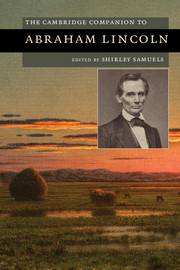Book contents
- Frontmatter
- Introduction
- 1 Rhetorically Lincoln: Abraham Lincoln and Oratorical Culture
- 2 Abraham Lincoln and Poetry
- 3 Seeing Lincoln: Visual Encounters
- 4 Lincoln's Gettysburg Address and Second Inaugural Address
- 5 Lincoln and the Natural Nation
- 6 Abraham Lincoln and the American Indians
- 7 Abraham Lincoln and the Self-Governing Constitution
- 8 Abraham Lincoln and Spiritual Crisis
- 9 America and Britain during the Civil War
- 10 Lincoln in International Memory
- 11 Lincoln's Hemispheric Relations
- 12 Lincoln on Hallowed Ground
- Guide to Further Reading
- Index
10 - Lincoln in International Memory
Published online by Cambridge University Press: 28 September 2012
- Frontmatter
- Introduction
- 1 Rhetorically Lincoln: Abraham Lincoln and Oratorical Culture
- 2 Abraham Lincoln and Poetry
- 3 Seeing Lincoln: Visual Encounters
- 4 Lincoln's Gettysburg Address and Second Inaugural Address
- 5 Lincoln and the Natural Nation
- 6 Abraham Lincoln and the American Indians
- 7 Abraham Lincoln and the Self-Governing Constitution
- 8 Abraham Lincoln and Spiritual Crisis
- 9 America and Britain during the Civil War
- 10 Lincoln in International Memory
- 11 Lincoln's Hemispheric Relations
- 12 Lincoln on Hallowed Ground
- Guide to Further Reading
- Index
Summary
In giving freedom to the slave, we assure freedom to the free – honorable alike in what we give, and what we preserve. We shall nobly save, or meanly lose, the last best hope of earth.
Abraham Lincoln, Message to Congress, December 1, 1862On November 29, 1864, the International Workingmen's Association, a federation of European workers, trade unionists, and social reformers founded in London, wrote to Abraham Lincoln. “We congratulate the American people upon your reelection by a large majority,” the address began, drawing attention to the importance of the popular vote in sounding the death knell to slavery in the American republic. “If resistance to the Slave Power was the reserved watchword of your first election, the triumphant war cry of your reelection is, Death to Slavery.” Written in English by Karl Marx and signed in London on behalf of the International Workingmen's Association by some fifty-seven members from Great Britain, France, Italy, Poland, and Switzerland, the letter envisions the Civil War not as an isolated national or internecine struggle but in epic terms as a “titanic American strife” in which “the star-spangled banner” will also determine “the destiny” of European workers.
Lincoln's speeches had consistently envisioned the Union war as part of a world historical struggle for the people and democracy: “We cannot escape history,” he said of the logic of emancipation in an address to Congress in 1862, “We know how to save the Union. The world knows we know how to save it.” The International Workingmen viewed the American Civil War in similarly historical and global terms. However, for them it was a war for black and white free labor.
- Type
- Chapter
- Information
- The Cambridge Companion to Abraham Lincoln , pp. 155 - 182Publisher: Cambridge University PressPrint publication year: 2012



